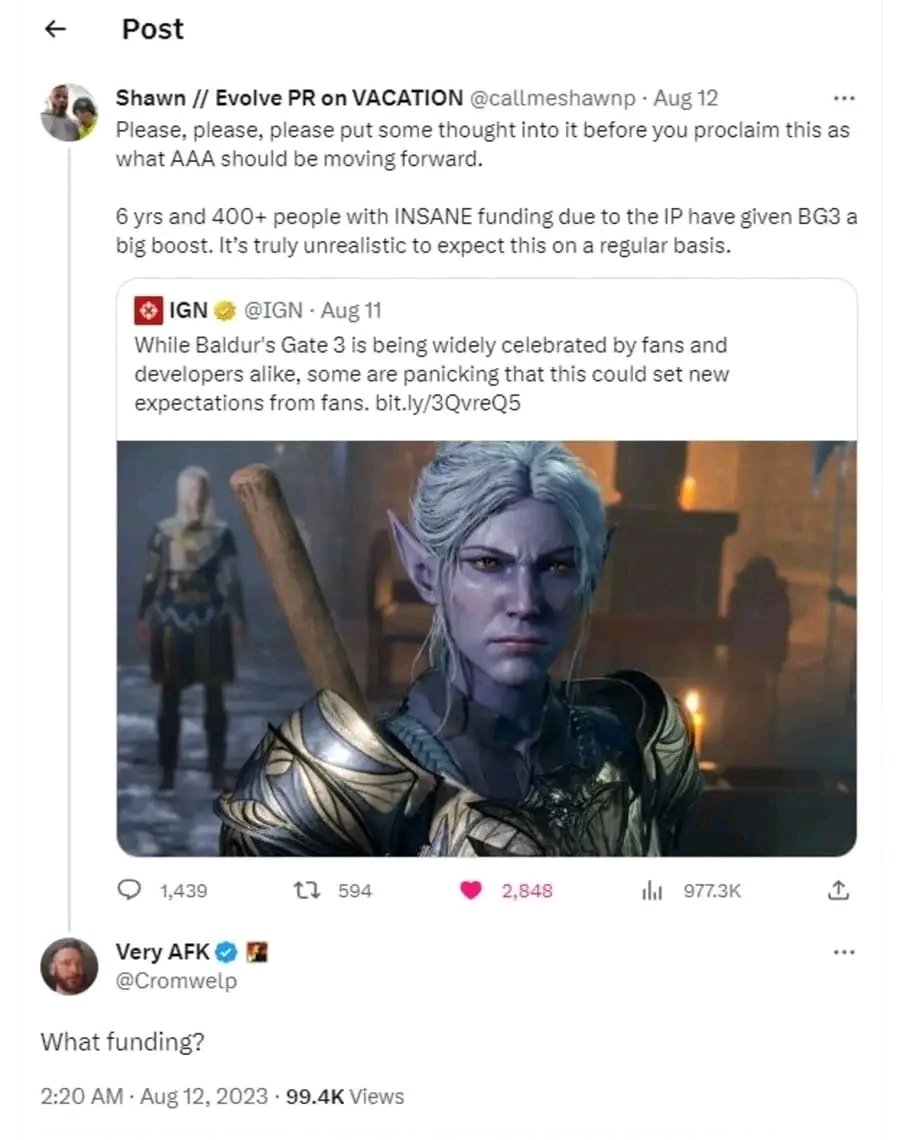1303
you are viewing a single comment's thread
view the rest of the comments
view the rest of the comments
this post was submitted on 16 Aug 2023
1303 points (96.2% liked)
Games
33086 readers
1395 users here now

Welcome to the largest gaming community on Lemmy! Discussion for all kinds of games. Video games, tabletop games, card games etc.
Weekly Threads:
Rules:
-
Submissions have to be related to games
-
No bigotry or harassment, be civil
-
No excessive self-promotion
-
Stay on-topic; no memes, funny videos, giveaways, reposts, or low-effort posts
-
Mark Spoilers and NSFW
-
No linking to piracy
More information about the community rules can be found here.
founded 2 years ago
MODERATORS

I have no problem if games reached this via a similar model that Larian used here (lots of experienced staff, pre-built systems, 6 years of development, 3 years of expertly done early-access with a highly engaged player base) but they're not going to. They're going to implement more crunch, more abuse, more destruction of the few people who want to work in games in order to get there. And that's where I have the issue.
I want shorter games, with worse graphics, made by people who get paid more to do less. Because that's what's needed to make truly great games. People who are passionate, not burning themselves out just to barely make deadlines, make great games.
What's particularly notable about this well above average gaming year is that the clearly top two games so far aren't using state-of-the-art graphics.
Given how messy PC gaming has been lately, with a recent history of GPU shortages followed by an underwhelming new generation and some very poor game optimization, I wouldn't mind seeing a trend of game development slowing down on graphics tech for a bit.
We have to go back!
But also legitimately. Like remember how good games would get near the end of a console's lifecycle? Then a new console generation would drop and the games would look sharp, but also a bit wonky, until enough years has past, and thennn... another new console generation would drop, and the constraints would disappear again. Always too soon, I thought - just as the games were getting truly good again!
Heh, yes, I still have fond memories of the late 16-bit generation and early fifth-gen games that didn't get on board the 3D bandwagon. Sprite-based games started to look mighty sexy until everyone decided that untextured polygons were the way to go for a while. 😑
Always preferred Duke 3D to Quake. The later is way more sophisticated from the technical standpoint (though Build does allow some neat tricks) but Duke is just so vibrant and fun. Destructible environment, original weapons, large enemy variety and proper bosses... Meanwhile Quake is just... brown.
Educate a pleeb here, I've been out of the gaming loop. What's the notable exceptions of great games this year and what two that are not state-of-the-art graphics do you mean?
This thread's on Baldur's Gate 3, that's one of them. I should have specified the other of the two most highly-rated games this year; it's The Legend of Zelda: Tears of the Kingdom. Both games are more or less running last-gen graphics tech and are ahead of the pack on review scores. Zelda looks good for a Switch game, though.
You could probably ask a dozen gaming enthusiasts and get a dozen different answers on why this year has been exceptional. I'd say it's because we have a lot of big releases from venerable franchises arriving all in the same year (Baldur's Gate is one, plus Diablo, Final Fantasy, Harry Potter, Resident Evil, Star Wars, Street Fighter). There are hits from new IPs like Cassette Beasts, Dave the Diver, Hi-Fi Rush, and maybe Starfield in a few weeks if it's not a disaster.
It's a nice mix of old and new worlds and plenty of surprises. On top of all that, it's only August. I think there's a sense that the industry is starting to leave the pandemic behind, too.